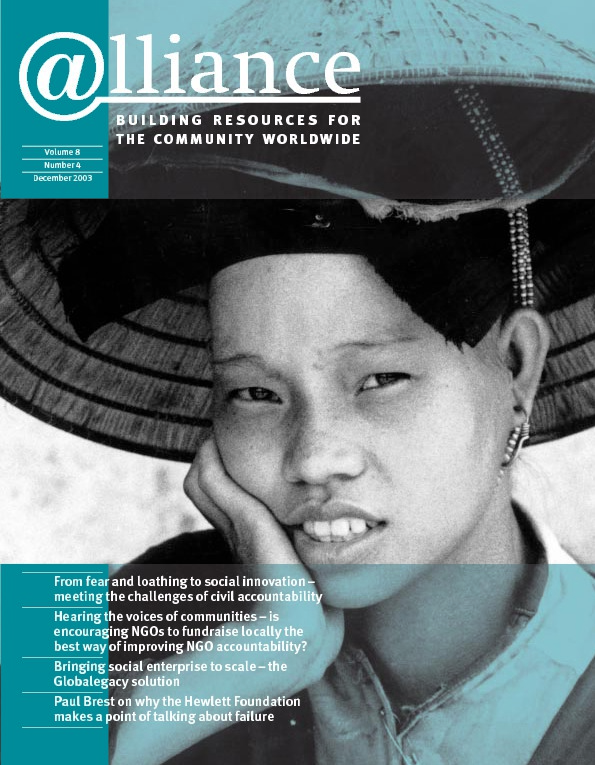In the last decade Latin America has witnessed a marked increase in civil society participation in the public arena. But this trend has not been totally welcome around the continent and questions about CSO governance and accountability are increasing. In this situation, can CSOs learn anything from business in Latin America?
Responses to the higher profile of CSOs vary widely across the region. In Brazil, for example, President Lula’s government considers NGOs to be valid actors in the public arena, especially on social issues, and business people are proud to sit on NGO boards and support NGO work. Chile and Nicaragua, however, have had serious public debates about CSO management of financial resources, and in Colombia the President and Minister of Interior have publicly denounced human rights and environmental NGOs as supporting illegal fighting or at least as useful puppets of the ‘guerrilla’. Signals sent last June by the US American Enterprise Institute and Federalist Society for Law and Public Policy Studies are probably going to reinforce criticism of CSOs in the region (see p00).
CSOs have been questioned because of their unaccounted use of financial resources and because they actively participate in and influence public debates without being publicly elected or controlled by a public body. There are also debates about inefficient management, absence of clear results and inability to measure and demonstrate impact. Corrupt politicians and others have used the not-for-profit model to channel illegal payments and NGOs operating in countries like Colombia and Nicaragua are seen as ‘a donor nightmare’, because of the perception that corruption will affect donations.
So this seems the right time to think about reputation management. Just as companies are beginning to realize that they do not operate in a vacuum, NGOs could start thinking about the benefits of being accountable and transparent in order to gain public trust and solidify their role in the public arena.
Sustainability reporting
An interesting first step could be sustainability reporting. The guidelines developed by the Global Reporting Initiative (GRI) were designed to be used by any organization, not only companies, and can be used for reporting social, environmental and financial performance.
A very interesting step in this direction is the experience of the Avina Foundation in south Chile, where ten small NGOs will issue their first sustainability reports in 2004. With some support from companies in GrupoNueva that have published GRI reports in the past, the group developed a reduced version of the GRI Guidelines to cover governance, origin and management of financial resources, labour issues such as compensation and discrimination in the workplace, and environmental impact.
Organizations that issue public reports normally receive great returns in terms of better management, and alignment of employees and partners, with the added benefit of trust from stakeholders who can track their performance and understand their processes and objectives. It seems apt that NGOs created to promote topics such as citizen participation, environmental education and equal opportunities should make sure their internal policies and procedures are really aligned with their values.
Stakeholder mapping
Stakeholder mapping may be another useful idea for CSOs. This is a practice that is just starting in business in the region. Companies in GrupoNueva, however, find it a very useful tool to establish a mutually beneficial relationship with their priority stakeholders, and to integrate stakeholder engagement into their management systems.
Just as companies account for their use of financial resources to shareholders, non-profits normally report to donors about the use of their funds and some even have externally verified financial accounts. But they also have an impact on other stakeholders, such as employees and partners, and can be affected by others in society, who may have a valid interest in their activities. Understanding who may affect them and who their actions affect may help NGOs to be more effective in their activities, understanding the expectations and perceptions of their stakeholders.
A pending issue is the development of internal checks and balances that are the basis for good governance. NGOs may be too small to incorporate internal auditing practices, such as audit committees that report directly to the board, for example. External verification of reporting by third parties, such as independent accrediting agencies, could help improve internal accountability but can also be too expensive for small NGOs. Peer reviews may therefore be an interesting way to help CSOs achieve good governance practices, but this is still an idea that has to be tested.
Companies are discovering the benefits of proper governance, transparency and accountability as tools for better management. Partnerships with civil society are proving to be sources of learning and good tools to understand society’s expectations and emerging trends. CSOs may find benefits in implementing similar tools to establish themselves as valid actors in public debates.
Maria Emilia Correa is Vice President for Social and Environmental Responsibility at GrupoNueva. She can be contacted at mariaemilia.correa@gruponueva.com


Comments (0)